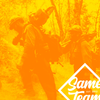"We didn’t start the fire… but we tried to fight it."
That line lingers. It captures what so many teams are feeling right now: caught in a blaze they didn’t spark, doing their best to contain it with whatever tools they’ve got left.
This week I came across We Didn’t Start the Fire: The Crisis of Middle Management in Tech, an that used this metaphor brilliantly to describe the state of middle management in tech. It resonated not just for what it said about leaders, but for what it revealed about the unsustainable expectations placed on entire teams. And it reminded us: what looks like resilience is often just exhaustion in disguise.
This isn’t a problem of individual performance. It’s a structural fire. And it’s spreading.
You’ve probably felt this too: the creeping weight of "just one more thing," the slow fade of creativity under constant urgency, the meetings that feel more like triage than progress. You’re still showing up. Still doing the work. But something’s off.
The slow burn of system failure
In a 2025 survey of over 8,200 tech workers, more than 84% reported burnout. Designers and researchers saw the biggest sentiment drop, and only 26.6% of respondents rated their managers as highly effective. We're in the midst of a crisis, a colossal fire.
That’s not a critique of individuals. It’s a signal that the system isn’t working.
"When the people responsible for crafting human-centred experiences are themselves feeling dehumanised by their work environments, it signals a fundamental breakdown in how we value and support creative work."
That breakdown doesn’t stop at any particular rung. When systems are built for constant reaction rather than thoughtful prevention, everyone feels the heat.
More tasks, fewer tools
Managerial responsibilities have ballooned, often absorbing work from roles that were never backfilled. But teams feel this too. Administrative support didn’t return. Leave coverage is spotty. AI tools promised relief, but often added complexity instead.
The pattern? Additive change. We pile on more tasks, meetings, goals, and tools—without removing what no longer serves. Burnout isn’t just about pace; it’s about weight.
Rangers, not hotshots
We don’t need more hotshot firefighters on teams. We need forest rangers. People who can steward the system, plan ahead, and intervene early—not just sprint from one emergency to the next.
That applies to everyone. Whether you’re leading a product org or running design QA, your work is more sustainable (and impactful) when the system gives you room to think, not just react.
What hotshots can teach us about surviving the burn
Hotshot firefighters are trained for long, grueling fire seasons—not quick fixes. They face extreme conditions, just like many teams today, but they don’t rely on heroics. They rely on systems. And that’s where we can learn a lot.
Their training offers four principles that speak directly to how we can prevent burnout:
- Train for endurance, not martyrdom
Hotshots are conditioned to work sustainably under stress. They don’t expect to save the forest in a day. Teams need that same mindset shift: progress over perfection, steadiness over sprinting. - Define roles, clearly and constantly
Every hotshot knows their job, their position, and their fallback plan. The ambiguity that creeps into tech teams (“Who owns this?” “Is this mine?”) is more than inefficient—it’s exhausting. Clarity is a form of care. - Respect thresholds
Hotshots are taught to walk away from fires they can’t control. They map exit routes. They plan for risk. Teams can learn from that, too. Knowing when to pause, pivot, or ask for help is not weakness—it’s part of the job. - Prepare more than you react
Most of a crew’s work happens before the fire arrives: clearing brush, setting boundaries, defining safe zones. In team culture, this looks like setting expectations, scoping properly, and protecting margin. Proactive beats reactive.
Burnout isn’t just about what’s on fire. It’s about whether we’ve done the work to stay safe inside it. Teams need more than motivation—they need structure, spacing, and shared responsibility.
Designing for prevention
So how do we stop piling on kindling and start clearing brush? It starts with systemic subtraction:
- Subtract before you add. When a new initiative rolls in, ask what can come off the plate.
- Build real leave coverage into the system. Not just for managers. For everyone.
- Treat AI as a tool, not a savior. It won’t fix structural gaps by itself.
- Make proactive work part of the job, not a luxury.
- Normalize naming what's unclear. Silos are for grain, not greatness.
It's important to remember that subtraction is a leadership skill.
This is everyone’s fire line
We know and are seeing more people step away from management (or wish they could). Others are choosing simpler roles. Not because they don’t care, but because they care enough to preserve what’s best in their work and creativity.
You don’t have to be a leader to feel that pull. Anyone on a team can feel like a forest ranger who hasn’t had the chance to tend the land. Anyone can feel stretched so thin that strategy, creativity, and connection start to disappear. We don’t want to just fight fires. We want to help prevent them. And we’re grateful for the new language this metaphor offers for doing that work.
So here’s your forest-floor reflection: What’s one thing you could subtract this week to create more space for the work that matters?




